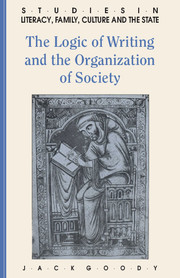3 - The state, the bureau and the file
Published online by Cambridge University Press: 05 June 2012
Summary
How has writing influenced the polity? Or to put it another way, how do regimes with writing differ from those without? The answer has to be many layered. Modern nations are obviously highly dependent upon writing for their electoral systems, their legislatures, their internal administration and their external relations. For the distribution of information on which decisions are based, the ideologies that govern the formation of parties, not simply writing but the mechanical reproduction of the word through printing, is critical. Obviously the whole constellation of modern political institutions and behaviour is part of a developing tradition in which changes in the mode of communication play an important role.
But how about the earlier polities? Once again I want to look at selected features of the first literate states of the Ancient Near East, rather than the more recent examples of Greece and Rome, on the grounds that they are closer to the largely oral states of Africa and more likely to pinpoint particular differences to which writing has contributed.
In examining the influence of writing on the polity, I am looking mainly at aspects of political organization rather than political process. I mean by this that while politics as the struggle and use of power pervades all levels of the social system, political organization generally refers to the most inclusive one. When social anthropologists in the course of the 1930s studied the large-scale African kingdoms with differentiated political institutions, they looked for a framework within which to compare the ‘tribal’ systems that had hitherto occupied much of their attention.
- Type
- Chapter
- Information
- The Logic of Writing and the Organization of Society , pp. 87 - 126Publisher: Cambridge University PressPrint publication year: 1986
- 1
- Cited by

